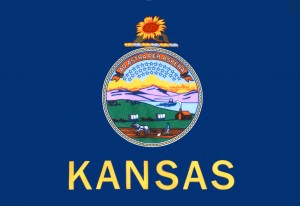
Senate Bill 401 was proposed in response to controversy that erupted in January after a teacher put a sex education poster on a classroom door at a Shawnee Mission middle school in Johnson County. The poster, entitled “How do people express their sexual feelings?,” featured a list of 17 behaviors ranging from holding hands to sexual intercourse. A parent complained, the poster was removed, and the sex education program was suspended pending a review of the instructional materials.
SB 401 would remove an exemption in current law that protects materials that are part of “an approved course or program of instruction.” As a result, teachers may be held accountable for accidental exposure to materials deemed offensive or even for the use of traditionally accepted educational materials — such as Shakespeare’s plays, classical art and sculpture, and literature — if someone in the community decides the content is offensive.
Senator Mary Pilcher-Cook, who introduced the bill, is hyperbolic (if not hysterical) in her assessment of the current law exempting approved teaching materials:
“Right now if a teacher were to give pornography (to a student) … it is not likely at all that a prosecutor would take the case because there is such a high hurdle protecting our schools.”
To say that Pilcher-Cook’s argument is fundamentally flawed is an understatement — the idea that pornography would be part of “an approved course or program of instruction” is utterly ridiculous.
Advocates for the bill argue that a clause defining offensive material as anything a “reasonable person would find that the material or performance lacks serious literary, scientific, educational, artistic or political value for minors” would protect most educational materials. The American Family Association’s Phillip Cosby testified in defense of the bill, maintaining that the bill would not target art:
“They’re saying somehow this is equated with art, but no, no, no,” he said. “That is not the issue in front of us.”
If Cosby’s name seems familiar, it’s because we’ve covered his antics on CBLDF.org before: For more than a decade, he has engaged in a pattern of bullying against public artwork and businesses throughout Kansas. In 2012, Cosby used a loophole in Kansas law to attack “Accept or Reject,” a sculpture by Yu Chang that was donated to the Overland Park arboretum in Kansas. CBLDF Contributing Editor Maren Williams covered the story:
[Cosby availed himself] of a Kansas law whereby “citizens can initiate a grand jury investigation if they collect signatures from more than two percent of the county’s voters.” Grand juries do not determine guilt or innocence, but decide whether an indictment and full trial are warranted.
This strategy is not new to Cosby — in fact, he’s been determinedly using it without much success to try to bully businesses since 2003, when he formed a crusade against the Lion’s Den Adult Superstore in his hometown of Abilene. In addition to summoning a grand jury, he and several cronies picketed the store for 100 days and harassed customers by ‘outing’ them to their employers and family members. Eventually Cosby’s case against the store was thrown out because it relied on a law that had already been declared unconstitutional by the state supreme court, and the Lion’s Den still stands to this day.
Since then, Cosby has launched obscenity investigations against businesses across Kansas, including liquor stores, gas station/convenience stores, smoke shops, a Spirit Halloween franchise, and a Latino market called El Gringo Loco.
Based on Cosby’s past behavior, it’s not too difficult to imagine him using SB 401 to attack educational materials across the state if he personally decides they are offensive.
Education groups and the ACLU oppose the bill, citing overly broad language that could lead to widespread censorship and questioning its constitutionality. Suzanne Perez Tobias and Bryan Lowry with The Wichita Eagle spoke to opponents of the bill:
Holly Weatherford, spokeswoman for the Kansas chapter of the ACLU, said Thursday at the Capitol that the bill is “facially unconstitutional.”
“The way this bill is currently written, it is so overly broad that it’s hard to even evaluate what all of the implications or consequences are of its reach,” she said.
Randy Mousley, president of United Teachers of Wichita, said the proposed legislation is “a solution in search of a non-existent problem.”
“It’s just an overreach where some particular group is trying to impose their values on everybody else in society,” he said. “There’s not that many instances (of teaching materials being challenged), but the unforeseen consequences are numerous.”
The language in the bill is being reviewed and revised to try to address these concerns, but educators in the state are widely opposed to its passage. For more on the story, visit The Witchita Eagle. We’ll be following the story as it develops.
We need your help to keep fighting for the right to read in 2014! Help support CBLDF’s important First Amendment work by visiting the Rewards Zone, making a donation, or becoming a member of CBLDF!

